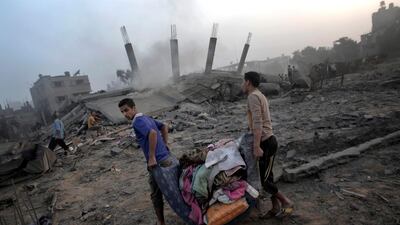The Arab-British satirist Karl Sharro often makes pithy political observations on Twitter. One of his most recent ones was fairly simple – and undercut with a poignant truth: “Israel has given Palestinians a choice: accept the humiliation of life in an open-air prison or we shoot you. Go on, make that choice.”
Sharro has a point. A broader point is this: the "international community", whatever that phrase still means, allows for that choice to be made – and makes little or no effort to change it. On the contrary, the "choice" becomes more stark every day, as the recent killings in Gaza have shown.
Let us be clear: the deaths of Palestinian protesters in Gaza at the hands of the Israeli military are hardly the only abhorrent occurrence that has taken place in the region over the past week. The actions of the Syrian regime in Yarmouk, for example, are especially detestable and they have received a paltry amount of attention, which is disgraceful. And certainly, it does not appear that the "international community" cares about that arena of suffering – a grotesque arena to be sure – very much at all.
What is striking, nevertheless, about the killings in Gaza is how much discussion there was in the western media on the Palestinian question – and how indescribably nauseating so much of that discussion was. Day after day, piece after piece, especially in the US press, we were bombarded by critiques, not of those shooting unarmed Palestinian protesters in Gaza but of those being shot.
The very genuine and real problem of a lack of Palestinian leadership and the appalling conduct of the Hamas organisation were taken as clubs with which to beat Palestinians en masse over the head. Such critiques forget that it is Palestinians themselves who already suffer from the lack of genuine leadership and it is Palestinians themselves who suffer from Hamas more than anyone else.
But most fundamental of all is the truth that such critiques generally miss the larger frame within which the conflict exists. That frame is rather simple: it is called the occupation of Palestinians for a reason, because Palestinians are occupied and under siege by the Israeli military. Not the other way round.
It’s important to be clear about that because the way the discussion was unfolding in the past few weeks, one could be mistaken for thinking Palestinians were occupying Israeli territory and laying siege to Israelis.
It's clear that is nonsense. Not a single Israeli died as a result of the events of last week but more than 60 Palestinians perished under Israeli fire. But this is the nature of so much of the discussion around the occupation. Simply being clear that this is not some kind of battle between more or less equal opponents but a violent occupation and siege of one party by an overwhelmingly powerful actor seems to be too controversial to declare outright in much of the policy establishment in the West today.
On the contrary: rather than ask the basic question of how we can continue to allow the continuous dehumanisation and repression of a people for so many decades, we revoltingly ask instead why Palestinians "killed themselves for public relations purposes".
Now, in much of the world, the predicament of the Palestinians remains one that occupies a lot of attention, and rightly so. But here is the honest truth: they are on their own. Against the backdrop of a veritable laundry list of crises in the world, the Palestinian question, alas, is hardly a top priority.
Indeed, they have been a subject of conversation more often in the past few weeks for one reason alone: the Trump administration made things worse following the disastrous declaration surrounding the moving of the American embassy to Jerusalem.
Had that announcement not been made, the situation of the Palestinians would have still been awful and repugnant – because the siege and the occupation would have remained – but we wouldn’t be talking about it. Because, again, the laundry list of crises in the region in particular, and the world more generally, has left the Palestinians too far behind.
Is it thus inevitable that this be the case indefinitely? Not at all, because these are all the repercussions of choices made by those Tel Aviv continues to rely on for commercial and military support.
But change requires them to see Palestinians as fully fledged human beings that deserve the chance to live in freedom and dignity. What Palestinians get instead is lip service and rhetoric – and unfortunately, they might even cease to get that, as their future becomes sacrificed on the altar of some geostrategic game with different adversaries.
If and when that happens, we all should then remind ourselves – we had a choice and we consciously made the wrong one. We should at least be honest about that.
Dr HA Hellyer is a senior non-resident fellow at the Atlantic Council in Washington, DC and the Royal United Services Institute in London

